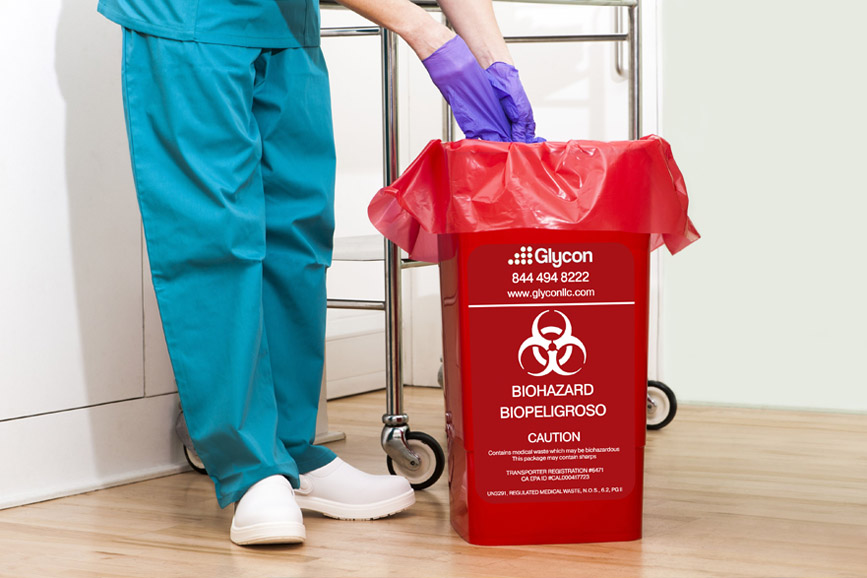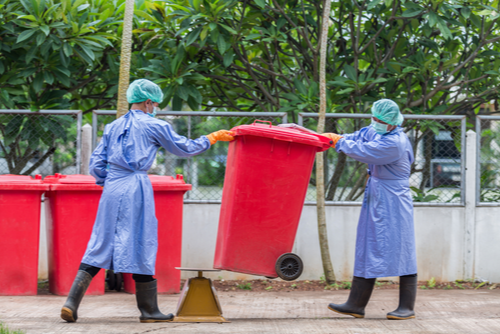Safeguarding Wellness: Expert Medical Waste Removal Services for a Clean Atmosphere
Safeguarding Wellness: Expert Medical Waste Removal Services for a Clean Atmosphere
Blog Article
Remain Ahead of Regulations: Specialist Recommendations on Medical Garbage Disposal
In a world where the health care market is frequently developing, it is important for clinical centers to remain in advance of guidelines when it involves the correct disposal of medical waste. With strict guidelines and constant regulative adjustments, it can be challenging to navigate the complexities of this process. However, with skilled recommendations, centers can make certain conformity and alleviate threats connected with inappropriate garbage disposal. From understanding the different categories of clinical waste to carrying out the ideal collection and partition approaches, this discussion will offer workable suggestions and important insights to aid facilities stay ahead of laws in the ever-changing landscape of clinical waste disposal.
Recognizing Medical Waste Categories
Recognizing clinical waste classifications is important for correct disposal and management in medical care facilities. Medical waste describes any waste produced by healthcare activities that might pose a risk to public health and wellness or the atmosphere. It is crucial to categorize clinical waste precisely to guarantee its safe handling, therapy, disposal, and transport.
There are a number of groups of medical waste that healthcare facilities require to be aware of. The most common groups consist of infectious waste, pathological waste, sharps waste, pharmaceutical waste, and chemical waste. Each classification has particular standards and laws for its proper management and disposal.
Transmittable waste consists of materials contaminated with blood or other physical liquids, such as gloves, dress, and lab cultures. Pathological waste describes human cells, organs, or body components that need special handling and disposal. Sharps waste includes utilized needles, syringes, and other sharp items that can trigger injury and transfer infections. Pharmaceutical waste makes up run out, extra, or contaminated drugs that require mindful handling and disposal. Finally, chemical waste includes solvents, disinfectants, and other chemical compounds used in medical care centers.
Remaining Up-To-Date With Regulatory Modifications
Staying current with governing adjustments is essential for healthcare facilities to ensure conformity and appropriate administration of medical waste disposal. medical waste removal near me. With policies frequently progressing, it is important for healthcare centers to remain up-to-date to stay clear of charges, fines, and prospective injury to the atmosphere and public wellness
To remain ahead of governing adjustments, medical care centers ought to develop a system for tracking and tracking updates. This can be done by subscribing to governing e-newsletters, attending meetings and workshops, and proactively joining sector associations. In addition, facilities need to assign a team member or group responsible for remaining informed and distributing information to pertinent stakeholders.
Regular interaction with regulatory companies is also crucial. Health care centers must establish connections with local, state, and government agencies to ensure they understand any adjustments in policies that might impact their waste management techniques. This can be done with regular meetings, engagement in public comment periods, and positive involvement with governing firms.
In addition, health care centers must consider partnering with waste monitoring business that concentrate on medical waste disposal (medical waste disposal services with WasteX). These firms are frequently skilled in the current regulations and can offer guidance and assistance to ensure compliance
Carrying Out Appropriate Collection and Segregation Methods
To properly handle medical garbage disposal, medical care centers have to develop correct collection and partition approaches according to governing standards. Carrying out these techniques makes sure the risk-free handling and disposal of potentially dangerous materials, protects the atmosphere, and minimizes the risk of infections and injuries to healthcare workers and the public.
Correct collection and partition techniques include using designated containers and classifying systems. Health care centers ought to offer clearly classified containers for various kinds of clinical waste, such as sharps, contagious waste, pharmaceutical waste, and non-hazardous waste. These containers ought to be color-coded and clearly significant to prevent confusion and promote easy identification.
Furthermore, healthcare facilities need to educate their team on the right procedures for accumulating and setting apart medical waste. This consists of informing them on the different sorts of waste, the proper containers to use, and the Read More Here relevance of adhering to guidelines and guidelines. Normal training sessions and correspondence course must be conducted to make certain that employee stay updated on finest techniques.
Moreover, healthcare centers should establish a system for regular collection and disposal of medical waste. This might involve partnering with qualified waste management companies that concentrate on medical garbage disposal. These companies will certainly ensure that the gathered waste is transported and disposed of in compliance with governing requirements.
Selecting the Right Disposal Approaches

Incineration is one of one of the most usual and reliable methods for getting rid of certain kinds of medical waste, such as pathological waste and sharps. It involves the controlled combustion of waste at heats, reducing it to ash. Go Here Nevertheless, incineration can launch hazardous toxins right into the air and add to air pollution.

Various other disposal techniques consist of chemical treatment, microwave therapy, and landfilling. Chemical treatment entails the usage of chemicals to disinfect and counteract the waste. Microwave treatment uses microwave energy to warmth and sanitize the waste. Landfilling entails burying the waste in an assigned land fill area (medical waste disposal services with WasteX). Nonetheless, landfilling ought to be the last hope as a result of the possible risk of contamination to soil and groundwater.
Making Certain Compliance With Paperwork and Training
After very carefully considering the appropriate disposal methods for clinical waste, health care centers need to make sure conformity with guidelines and lessen environmental effect by carrying out efficient paperwork and training procedures. This step is crucial in maintaining a lasting and secure environment for both healthcare employees and the public.

Health care workers who deal with medical waste ought to obtain appropriate training on waste partition, handling, and disposal treatments. By giving thorough training, medical care facilities can equip their staff to make informed decisions and lessen the risk of improper waste disposal.
Verdict
Finally, staying in advance of guidelines in medical waste disposal is essential for healthcare facilities. medical waste removal services. Recognizing the various classifications of medical waste, remaining upgraded with governing changes, applying appropriate collection and segregation methods, picking the proper disposal methods, and ensuring conformity via paperwork and training are all vital steps. By adhering to these guidelines, healthcare organizations can effectively dispose and handle of medical waste in a responsible and safe manner
From understanding the various categories of clinical waste to executing the ideal collection and segregation techniques, this conversation will certainly supply important understandings and actionable ideas to help centers remain ahead of laws in the ever-changing landscape of clinical waste disposal. - medical waste disposal services with WasteX
The most usual categories include infectious waste, pathological waste, sharps waste, pharmaceutical waste, and chemical waste. Health care facilities should offer clearly identified containers see this for various kinds of clinical waste, such as sharps, contagious waste, pharmaceutical waste, and non-hazardous waste. Medical care centers need to develop a comprehensive system to record and track all aspects of medical waste disposal, including kinds of waste created, quantities, and disposal techniques utilized. Healthcare workers who handle clinical waste needs to receive suitable training on waste segregation, dealing with, and disposal procedures.
Report this page